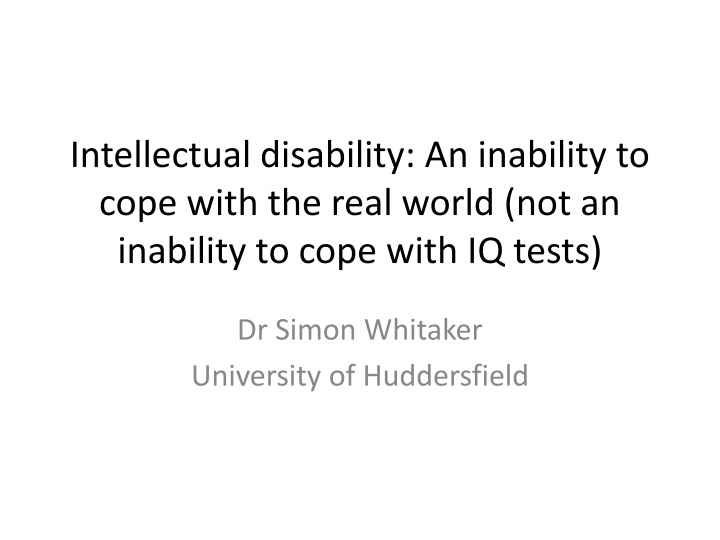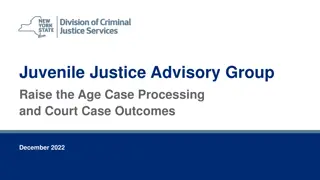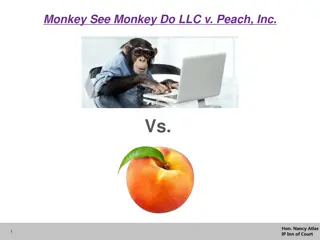
Intellectual Disability and IQ Testing: Insights from Research
Explore the concept of intellectual disability, the challenges with measuring IQ accurately, and the impact of the Flynn Effect on IQ tests over time. Discover key findings from studies examining IQ in individuals with low intellectual ability and autism. Gain insights into the differences between various intelligence tests and the evolving definition of intellectual disability.
Download Presentation

Please find below an Image/Link to download the presentation.
The content on the website is provided AS IS for your information and personal use only. It may not be sold, licensed, or shared on other websites without obtaining consent from the author. If you encounter any issues during the download, it is possible that the publisher has removed the file from their server.
You are allowed to download the files provided on this website for personal or commercial use, subject to the condition that they are used lawfully. All files are the property of their respective owners.
The content on the website is provided AS IS for your information and personal use only. It may not be sold, licensed, or shared on other websites without obtaining consent from the author.
E N D
Presentation Transcript
Intellectual disability: An inability to cope with the real world (not an inability to cope with IQ tests) Dr Simon Whitaker University of Huddersfield
Current definition There is an agreed international definition of ID (ICD-11, DSM-V, AAIDD): Significantly low intellectual ability (usually taken as IQ 70 or 75) explaining that it is now thought there is a 5-point margin of error. Significantly low level of adaptive/social behaviour (often defined as two Standard Deviations below the population mean in the composite measure of in two sub scales). All occurring before the age of 18 years.
Measuring IQ Can we measure IQ sufficiently accurately to have a cut off point at IQ 70?
A meta-analysis Whitaker (2008) A meta-analysis of the literature on the test re-test reliability of intelligence tests when applied to people with low intellectual ability (IQ<80). 14% of IQs change by 10 points or more.
Grondhuis & Mulick (2013). 47 Children aged 3 to 12 years with autism Leiter-R SB-5 diff r 87.11 (26.47) 64.66 (20.32) 22.45 .55
We (Gordon et al 2010) compared the WISC-IV and the WAIS-III in an empirical study on seventeen 16-year-olds in special education.
Results WISC-IV WAIS-III dif r FS IQ 53.00 64.82 11.82 .93
The Flynn Effect and the inconsistency of IQ tests over time and place
Measured IQ is going up Measured IQ (in the West) has been going up for at lest the past 100 years at a rate of about .3 of a point per year. Seems to be affecting fluid intelligence more than crystalline intelligence
Hypothesized reasons for the Flynn effect People are just getting better at doing tests. We live in a more scientific and intellectually demanding culture. We have smaller families. Diet is better (maternal and child). Health is better (maternal and child). The degree to which these factors will affect different groups will vary.
What is the alternative? Is there a better definition of ID that works internationally
Features of a new definition If we are concerned with people who are not as intellectually able as most people in their community this should be acknowledged. But it should not have IQ (or AB) cut off points. Though tests scores may inform the diagnosis. It should be based on clinical judgment. Making reference to an inability to cope.
Coping Ensuring that one s quality of life and that of one s dependents don t fall below a level deemed acceptable to the society in which they live.
Proposed Definition A person may be thought to have intellectual disability if he/she has consistently failed to cope with the intellectual demands of his/her environment.






















